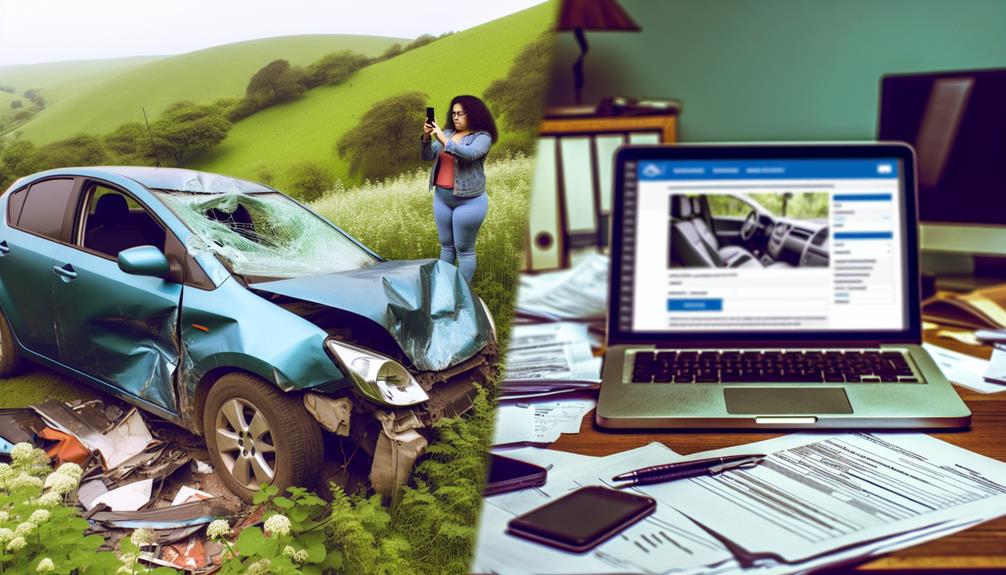Imagine you're in a minor fender-bender, and the stress of the situation starts to sink in. You know you need to file a car insurance claim, but the steps can seem overwhelming. From gathering the right information at the scene to knowing how to communicate effectively with your insurer, each choice you make can impact the outcome of your claim. Understanding these steps is vital, especially if you're dealing with an at-fault situation or an uninsured driver. So, what should you do first to guarantee a smooth claims process?
Key Takeaways
- Ensure safety first and gather essential information from all parties involved, including insurance details and witness contacts.
- Document the accident scene thoroughly with photos of damages, vehicles, and relevant street signs.
- File your claim with the insurance company promptly, providing detailed information and required documentation like police reports and witness statements.
- Keep a detailed record of all communications with the insurance provider, including names, dates, and claim reference numbers.
- Follow up regularly with the insurance company to check the status of your claim and ensure timely processing.
Steps at the Accident Scene
When you're involved in a car accident, it's important to act quickly and calmly. First, confirm everyone's safety by moving vehicles off the road if there are no injuries. If someone's injured or the other driver flees, call the police immediately. Next, gather essential information from the other driver, including their name, contact details, driver's license number, and insurance information. This data is critical for your claim.
Don't forget to snap detailed photos of the accident scene. Capture images of all vehicles involved, damages, license plates, street signs, and road angles. These visuals will help document the incident thoroughly. Additionally, talk to any witnesses present, noting their names and contact numbers, as their statements could be important for your claim.
Remember to obtain a copy of the police report after the incident. This official record is necessary when you file your insurance claim and can greatly aid in securing financial compensation for repairs to your vehicle. By following these steps, you'll set a solid foundation for your insurance process, making it easier to navigate the aftermath of the accident.
What to Do After Home
After confirming everyone's safety and gathering necessary information at the accident scene, the next steps you take at home are essential for your insurance claim. First, promptly report the accident to your insurance company. Provide detailed information about the incident, including the police reports, to initiate your car insurance claim.
Keep a detailed record of all medical treatments you've received, including medical bills and appointment notes. This documentation is important for your claim, especially if you have personal injury protection coverage.
Next, document damages to your vehicle and property by taking clear photographs. Save all receipts for vehicle repair and any other expenses related to the accident. This evidence will help support your claim with your insurance adjuster.
Maintain communication with your insurance adjuster. Write down their contact information and any instructions they provide regarding your claim process. If the other driver is found at fault, make sure you also follow up with the at-fault driver's insurance company for any applicable compensation. Finally, check with your provider for any additional coverage options, like rental car reimbursement, to ease your recovery during this time.
Repairing Your Vehicle

Repairing your vehicle is an essential step in the claims process after an accident. First, contact your insurance company to obtain a repair estimate and find out about preferred body shops. While you can choose any shop, using a preferred one may streamline your claim.
Once you select a body shop, verify they provide a detailed estimate that outlines necessary repairs and associated repair costs. The body shop will then submit this repair estimate to your insurance company, which will review it and may request adjustments based on their assessment.
If additional repairs are discovered during the repair process, the body shop can submit a new estimate for your insurance company's approval to cover those extra costs.
Throughout this process, communication is key. Keep all documentation related to the repairs, including receipts and any correspondence with the body shop and your insurance adjuster. This will help guarantee a smooth claims process and avoid any delays in getting your vehicle back on the road. Remember, thorough documentation is your best ally when managing repair costs and claims with your insurance company.
Handling At-Fault Situations
If you find yourself at fault in an accident, it is important to report the incident to your insurance company without delay. This step is vital for processing your claim and understanding your coverage options. You'll need to document details of the accident, including the time, location, and circumstances, as well as any witness information.
Here are some key points to keep in mind:
- Your at-fault driver's policy will typically cover damages and medical expenses for the other party.
- Be prepared for your insurance adjuster to obtain police reports and assess vehicle damage.
- If the other driver's insurance company disputes liability or offers a low settlement, you might need to negotiate further or file a claim with your own insurance.
Dealing With Uninsured Drivers

When you're involved in an accident with an uninsured driver, the situation can quickly become stressful and complicated. It's essential to know your options and how to file your claim effectively.
| Action | Details |
|---|---|
| Report the Accident | Notify your insurance company promptly. |
| Gather Documentation | Collect police reports, photos, and medical information. |
| Understand Coverage Options | Review your collision coverage and PIP. |
If the other driver is uninsured, having uninsured motorist coverage can be a lifesaver. It helps cover vehicle repairs and medical expenses. In Texas, insurers must offer this coverage, so if you opted out, consider the risks.
If the driver flees, your collision coverage may cover repairs, while your Personal Injury Protection (PIP) can help with medical expenses. Always file a claim as soon as possible, providing all necessary insurance information to streamline the claims process.
If you're unsure about any aspect, don't hesitate to consult accident attorneys for guidance. They can help you navigate this challenging situation and guarantee you receive the compensation you deserve.
Essential Resources for Claimants
Maneuvering the aftermath of an accident can be overwhelming, especially after dealing with uninsured drivers. Fortunately, you have essential resources at your disposal to help you file a claim and navigate the insurance process efficiently.
- Texas Insurance Podcast: Tune in for valuable tips and insights on managing your auto insurance claims.
- Online Videos: Utilize step-by-step guidance that covers everything from filing claims to understanding coverage options.
- Insurance Agents: Don't hesitate to reach out to agents who can clarify your policy and answer questions regarding your claim.
If you encounter issues with your insurance company or agent, report your complaints to the Texas Department of Insurance to seek accountability. It's also wise to be aware of common pitfalls that could jeopardize your claim or lead to fraud, ensuring you receive fair compensation for your property damage and medical care.
If you feel overwhelmed, consider consulting with an experienced lawyer who can guide you through the intricacies of your claim. Remember, knowing your rights and resources is vital in securing the compensation you deserve after an accident.
Filing the Insurance Claim Process

Filing a car insurance claim can feel intimidating, but breaking the process down into manageable steps can make it easier. First, contact your insurance provider immediately after the accident, regardless of who's at fault. Prompt notification is vital for the claims process. As a driver, it's important to document all details of the incident, including the time, location, and the parties involved.
Next, gather and submit necessary documentation to support your claim. This includes the police report, photographs of the scene and damages, and any witness statements. These documents bolster your case and help your insurer evaluate the claim efficiently.
Keep a record of all communication with your insurance company. Note the names of representatives, call times, and any claim reference numbers. This will be invaluable if any issues arise later.
Frequently Asked Questions
What Are Three Important Tips on Filing an Auto Insurance Claim?
You wouldn't believe how quickly things can unravel after an accident. First, report it to your insurance company within 24 hours to kickstart your claim. Next, gather all essential documents, like police reports and photos, to strengthen your case. Finally, know your policy's coverage limits before filing. This'll help you gauge whether to move forward with a claim based on repair costs. Stay organized and informed for the best outcome!
What Are the Steps of an Insurance Claim?
To navigate the insurance claim process, start by gathering essential information like accident details and involved parties' insurance info. Next, notify your insurance provider right away, ideally within 24 hours, and submit all necessary documents. Keep a record of all communications with your insurer, noting dates and names. Remember, insurance companies have specific timelines to respond to claims, so stay on top of follow-ups for a smoother experience.
How Long Do You Have to Report an Accident to Your Insurance in Texas?
Timely reporting's truly terrific! In Texas, there's no strict statute for how long you have to report an accident to your insurance, but most companies suggest you do it within 24 hours. Waiting too long might complicate your claim and could lead to lower compensation. Remember, if there's injury or significant damage, you'll need to notify law enforcement, but that doesn't change your insurance reporting timeline. Always check your policy for specific deadlines!
Do You Need a Police Report to File an Insurance Claim in Texas?
You don't always need a police report to file an insurance claim in Texas, but it's highly recommended. If there are injuries or significant damage, it's best to get one since it helps document the incident. Even if the police don't respond, gather details from witnesses and document everything yourself. Having that report can make your communication with your insurer smoother and strengthen your case when filing the claim.
